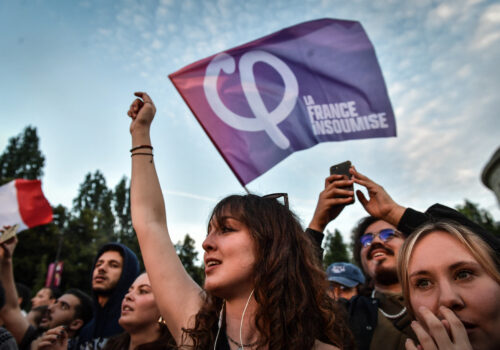The far right suffers a shocking defeat in France
JUST IN
It’s a tale of two “fronts.” In a surprise turnaround, the left-wing New Popular Front came out on top in France’s parliamentary elections on Sunday, with voters coalescing around alternatives to Marine Le Pen’s far-right National Rally, which finished third. President Emmanuel Macron, whose centrist alliance placed second, did not attain his hoped-for parliamentary majority, but his move did reinforce the tendency of French voters to come together as a “republican front” to keep the far right out of power. We turned to our experts working at the front lines of this story to explain the results and what to expect next.
TODAY’S EXPERT REACTION COURTESY OF
- Gérard Araud (@gerardaraud): Distinguished fellow at the Europe Center and former French ambassador to the United States
- Rama Yade (@ramayade): Senior director of the Africa Center and former French cabinet minister
- Jörn Fleck (@JornFleck): Senior director of the Europe Center and former European Parliament staffer
Right in reverse
- Macron called the snap parliamentary election to seek “clarification” from the electorate after National Rally finished first in European Parliament elections last month. Then National Rally earned the most votes in the first round of this election a week ago. So Sunday’s result, Gérard tells us, is “a total surprise. The anti-far-right bulwark has worked,” thanks in large part to third-place finishers from the left and center dropping out ahead of the second round to consolidate the anti-far-right vote.
- “Great relief dominates in the country, which had come to the brink of an abyss,” Rama says. “But the aftermath will be difficult.”
- What does that aftermath look like? “A long crisis full of uncertainties and political instability,” Gérard predicts. “Macron has lost his bet for clarification from the electorate. He is weakened, but resignation and realism are not his strong points.”
Subscribe to Fast Thinking email alerts
Sign up to receive rapid insight in your inbox from Atlantic Council experts on global events as they unfold.

Coalition chaos
- Coalition governments, which are common in other European countries, are foreign to France. Macron will nominate a new prime minister (the incumbent, Gabriel Attal, said he will step down) but what happens after that is anyone’s guess. “While on paper and in media speculation, a coalition of the anti-[National Rally] forces is possible, in practice this will be hard to achieve,” Jörn tells us, particularly given the “maximalist demands” from far-left New Popular Front leader Jean-Luc Mélenchon.
- “The coming weeks will indeed be a test to determine whether the left and the center are able to cooperate,” Gérard says. That would likely require a split in the New Popular Front, “which has shown its fragility,” he adds. Macron’s centrists could work with the center-left Socialist party, leaving out Mélenchon’s La France Insoumise.
- And even after a coalition government forms, it will have “to avoid falling prey to a no-confidence vote,” Rama says. “The center of gravity of French politics will shift from the executive to parliament,” she forecasts, and “there is a possibility of permanent instability if the opposition parties unite.”
- And it’s worth noting that National Rally and its allies still got the most votes of any group on Sunday, even if they won only the third-most seats. Le Pen remains focused on the presidency when Macron’s term ends in 2027, stating on Sunday that “our victory has only been delayed.” Adds Rama: “The new French government has less than three years to succeed and refute this prediction.”
European earthquake
- While the European Union (EU) avoided the “worst-case outcome” of a National Rally government wreaking “budgetary and procedural havoc on France’s EU policies,” Jörn says the political chaos to come “will still weaken France’s position in Europe—and Europe itself.”
- France will face “uncertainty, paralysis, and a self-consumed political leadership,” Jörn tells us. Meanwhile, Macron’s “credibility and political capital have been sapped in the eyes of Europe’s leaders by his brinkmanship and unforced strategic mistake of calling the snap elections in the first place.”
- What does it all mean for Brussels? A diminished Macron “will weaken an important voice for forward-leaning, more ambitious EU positions,” Jörn predicts, on matters ranging “from internal reform to defense cooperation, support for Ukraine, and a tougher course on China.”
Further reading
Sun, Jul 7, 2024
Experts react: French voters beat back the far right in an election surprise. What’s next for France and Macron?
New Atlanticist By
The left-wing alliance New Popular Front and centrist parties aligned with President Emmanuel Macron emerged ahead of the far-right National Front on Sunday.
Wed, Jul 3, 2024
How are markets reacting to the French snap election?
Econographics By Sophia Busch, Charles Lichfield
The results of the first round of the French snap election led to diverging reactions in bond yields and stock prices.
Thu, Jul 4, 2024
What do Biden, Macron, and Sunak have in common? They brought it on themselves.
Inflection Points Today By Frederick Kempe
US President Joe Biden, French President Emmanuel Macron, and British Prime Minister Rishi Sunak are suffering from self-inflicted wounds that are likely to have long-term political and economic consequences.
Image: French far-right leader Marine Le Pen talks to journalists after partial results in the second round of the early French parliamentary elections in Paris, France, July 7, 2024. REUTERS/Kevin Coombs


